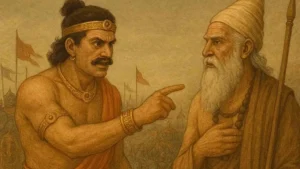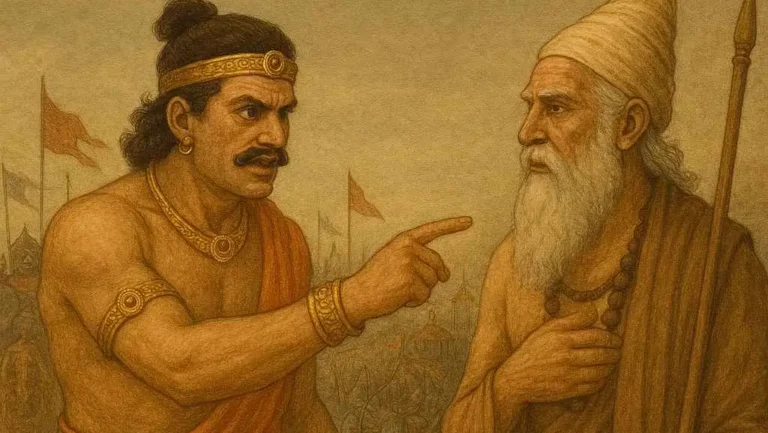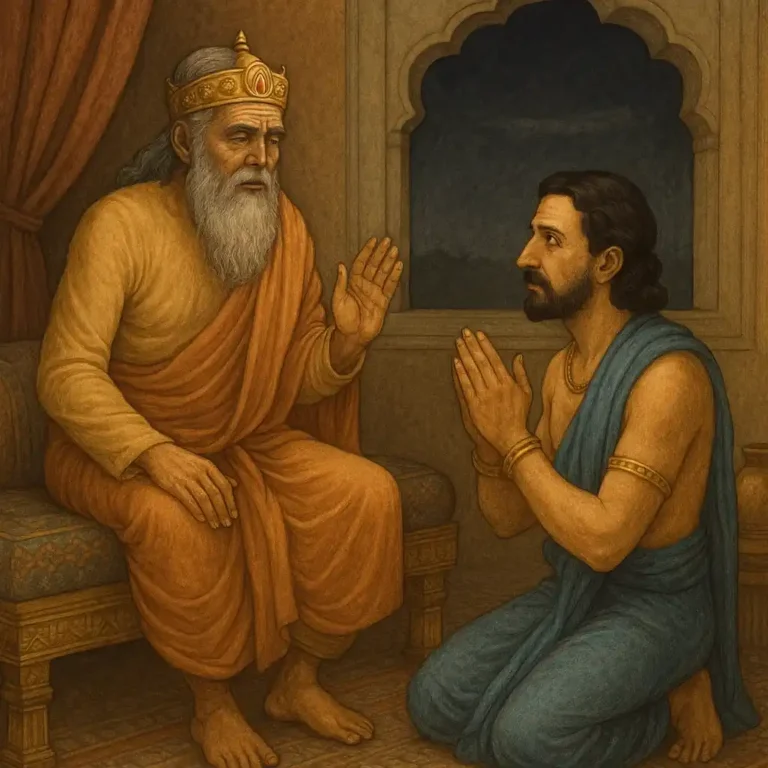What Gita Says About Fear and Jealousy?

Fear and jealousy are deeply ingrained in human nature. While some fears are purely imaginary, others stem from real uncertainties about the future or potential threats to our present stability. The Bhagavad Gita, understanding the complexity of human emotions, dedicates its first 19 verses to addressing fear. In this blog, we will analyze one of these verses and how it sheds light on fear, insecurity, and misplaced blame.
Verse from Bhagavad Gita (1.3)
पश्यैतां पाण्डुपुत्राणामाचार्य महतीं चमूम् |
व्यूढां द्रुपदपुत्रेण तव शिष्येण धीमता || 3 ||
paśhyaitāṁ pāṇḍu-putrāṇām āchārya mahatīṁ chamūm
vyūḍhāṁ drupada-putreṇa tava śhiṣhyeṇa dhīmatā
Glossary: paśhya—behold; etām—this; pāṇḍu-putrāṇām—of the sons of Pandu; āchārya—respected teacher; mahatīm—mighty; chamūm—army; vyūḍhām—arrayed in a military formation; drupada-putreṇa—son of Drupad, Dhrishtadyumna; tava—by your; śhiṣhyeṇa—disciple; dhī-matā—intelligent
Translation:
BG 1.3: “O revered teacher! Behold the mighty army of the sons of Pandu, arranged in a strategic formation by your own gifted disciple, the son of Drupada.”
Fear Makes You Small
Duryodhana, despite having a massive army—1.5 times larger than the Pandavas’—refers to his enemies’ forces as “mighty.” This statement is contradictory to his usual arrogant nature. Why would someone as boastful as Duryodhana acknowledge his enemy’s strength? The answer lies in fear. When fear grips us, we subconsciously amplify the power of that which we fear.
For example, a dictator’s rule is upheld not by their own power but by the fear in the minds of the masses. If the people recognize their collective strength, they could easily overthrow such a regime. Similarly, individuals often underestimate their own capabilities due to fear. Many people feel nervous in a job interview not because they lack knowledge or experience, but because they inflate the significance of the situation in their minds, making it seem bigger than themselves.
Fear diminishes us. It makes us perceive challenges as insurmountable, even when they are within our capacity to overcome.
Our Fear is Our Own Creation
Duryodhana fears the consequences of war, but his arrogance prevents him from admitting it or backing down. Instead, he seeks an excuse to shift blame. He taunts his teacher, Dronacharya, for training Dhrishtadyumna, the son of his enemy, Drupada, who is now leading the Pandava army.
This behavior is a reflection of what we often do in our own lives. We blame external factors for our fears and failures rather than acknowledging our role in them:
- “My parents ruined my childhood, which is why I struggle now.” (Implying, “I will struggle for the rest of my life.”)
- “My teachers were not good, which is why I don’t understand certain subjects.” (Implying, “I won’t bother to learn now.”)
- “My ex-wife took all my money, and now I am financially ruined.” (Implying, “I will never recover from it.”)
Instead of finding ways to improve, we often victimize ourselves and use past hardships as an excuse to remain stagnant. However, the Bhagavad Gita teaches us that we have the power to overcome any adversity by changing our mindset and actions.
Jealousy: The Root of Many Fears
Jealousy and fear often go hand in hand. Duryodhana’s fear of the Pandava army stems from his deep-rooted jealousy. He has always envied the Pandavas’ righteousness, their divine guidance from Krishna, and the respect they command. His fear is not just about losing the war but about being overshadowed by the very people he has despised for years.
In our own lives, we may experience jealousy when we see someone succeeding in areas where we feel inadequate. This can create a fear of being left behind, leading to irrational decisions and resentment. The key to overcoming this is self-awareness and self-improvement. Instead of resenting others, we must focus on our own growth and progress.
Overcoming Fear and Jealousy: Lessons from the Gita
- Recognize Fear as a Mental Projection – More often than not, our fears are magnified by our minds. Acknowledge them, but do not let them define your actions.
- Take Responsibility for Your Reactions – Instead of blaming external circumstances, understand that you have the power to change your situation.
- Transform Jealousy into Inspiration – Instead of being envious of someone’s success, use it as motivation to improve yourself.
- Shift Focus from Outcomes to Effort – Fear often arises from an obsession with results. The Gita teaches us to focus on our duties and efforts rather than being anxious about the outcomes.
Final words:
The Bhagavad Gita’s teachings on fear and jealousy remain highly relevant in today’s world. Whether it’s self-doubt, professional anxiety, or personal insecurities, understanding the root cause of our fears and taking proactive steps to overcome them can transform our lives. Just as Duryodhana’s fear made him see his enemies as more powerful than they truly were, our own fears often exaggerate obstacles. The key is to shift our perspective and take charge of our own destiny.
By applying these lessons, we can cultivate inner strength, overcome fear, and turn jealousy into a force for self-improvement.
What fears are holding you back? And how can you reframe them to empower yourself? Share your thoughts in the comments below!



